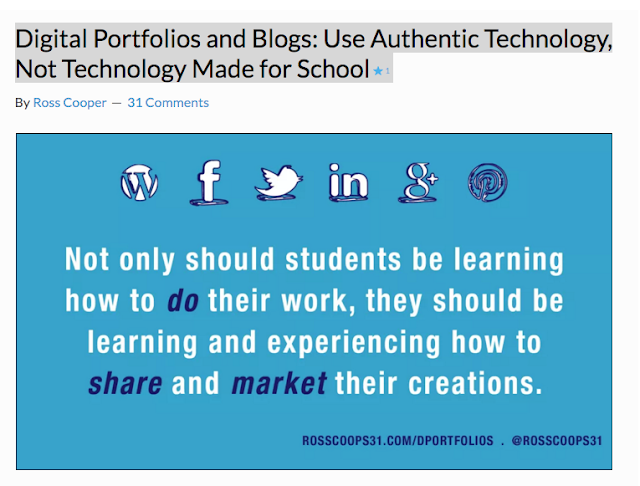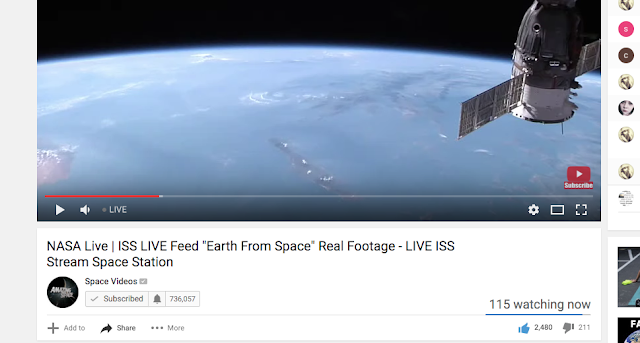This article is recommended by Ross Cooper in his blogpost about Digital Portfolios.
Here is the essence of the advice from THE RESUME IS DEAD (you can see it as a Kindle ebook)
Michael Margolis gives the following tips:
To help you with this, your bio should address the following 5 questions:
- Who am I?
- How can I help you?
- How did I get here (i.e. know what I know)?
- Why can you trust me?
- What do we share in common?
Your bio is the lynchpin for expanding your thought leadership and recognition, especially online. It frames the conversation and sets the tone. It’s your job to reveal a bit about yourself and how you see the world. Do this well, and people will eagerly want to engage with you further.
 |
| CLICK HERE |
So here is my bio
I'm a teacher of English at a language school and an SAT Tutor (I help students prepare for tests like SAT, ACT, PERT, GMAT, GRE and end of course exams).
Two quotes drive my life as a teacher:
Learning should be fun for the learner and the teacher. Dr. Abraham S. Fischler, former president of Nova University. His book of commentaries is available at TinyURL.com/Fischlerebook
I just lost six hours of my life. That's a text message from a teenager to his mother, commenting on his day at school in Bologna, Italy. The message could be sent by many teenagers.
Early in my career as a teacher (April 25, 2005) I heard Dennis Littky, a principal of a school in Rhode Island, say in an interview, "Ask students what they think of school and the most common response is BORING." Littky wrote a book called The Big Picture: Education is Everyone's Business. I obtained the right to translate that book into Spanish and I asked volunteers to translate the first chapter into Turkish, Arabic and Portuguese. The interview on National Public Radio and the book had such an impact on me that I carry these quotes in my head. Contact me for free ebooks.
TransformTeaching.org 954 646 8246
ManyPosters@gmail.com
School Features Real-World Learning, No Grades : NPR
www.npr.org/templates/story/story.php?storyId=4618720
Apr 25, 2005 - Met school director Dennis Littky meets with students (from left) Kyle ... Dr. Hector Cordero says she knew little when she started interning at his ...
NPR
- Who am I? I'm a teacher who prefers to be a "guide on the side." See TINYURL.com/TheGuideontheSide and TinyURL.com/LetsLectureLess
- How can I help you? I bring in procedures that I've seen in Auckland (New Zealand), San Diego and Los Angeles, Rhode Island and New York City.
- How did I get here (i.e. know what I know)? I listened to mentors who were inspired in part by Neil Postman (Teaching as a Subversive Activity). The title is scary, but Chapter 12 of the PDF (free) tells teachers how to make classrooms engaging.
- Why can you trust me? Check my blogs. I'm consistent.
- What do we share in common? You want students to be engaged. So do I.
Search "the guide on the side let's lecture less steve mccrea"
Search Results
Lets Lecture Less by Steve McCrea Guide on the Side 33 Pages Black ...
https://www.scribd.com/.../Lets-Lecture-Less-by-Steve-McCrea-Guide-on-the-Side-33...
Go to Scribd.com/theebookman and look for “Let's Lecture Less 2012 edition. ..... Steve McCrea, GuideontheSide.com, author of Guide On the Side (techniques ...[PDF]Let's Lecture Less
https://www.free-ebooks.net/ebook/Let-s-Lecture-Less/pdf?dl&preview
Let's Lecture Less. FreeEnglishLessons@gmail.com. 1. Let's. Lecture. Less. A short book of quotes and commentaries from a Guide On The Side. Steve McCrea.Let's Lecture Less: A short book of quotes and commentaries from a ...
https://www.amazon.com/Lets-Lecture-Less-quotes.../1479264555
Let's Lecture Less: A short book of quotes and commentaries from a Guide On The ... Steve McCreais a graduate student in Fort Lauderdale, Fla. and a high ...
Amazon.com, Inc.
McCrea, Steve Turning "Sages" into "Guides on the Side" | steve ...
www.academia.edu/.../McCrea_Steve_Turning_Sages_into_Guides_on...
When a teacher becomes a "guide on the side," there is a change in the school's ... Let's Lecture Less, edited by Steve McCrea (Visualandactive.com) and Mario ...
Academia.edu
[PDF]Transforming Teachers - tojde
tojde.anadolu.edu.tr/yonetim/icerik/makaleler/779-published.pdf
by S McCREA - Related articles
presentation is extracted from a newly published book, Let's Lecture Less, edited by. Steve McCrea(Visualandactive.com) and Mario Joel Llorente Leyva. ... The idea for the website GuideontheSide.com and book Guide On the Side came.Full text of "CAIT 50 150 Edition 2 Technologies May 29 For Teaching ...
https://archive.org/.../Let-s-Lecture-Less-2012-Edition-in-Color-78-P...
Let's Lecture Less A short book of quotes and commentaries from a Guide On The Side Steve McCrea GuideontheSide.com with Mario J. Llorente Leyva Dennis ...
Internet Archive
ERIC - Transforming Teachers, Transforming Schools: Turning "Sages ...
eric.ed.gov/?id=EJ997802
by S McCrea - 2012 - Related articles
When a teacher becomes a "guide on the side," there is a change in the school's ... Let's Lecture Less, edited by Steve McCrea (Visualandactive.com) and Mario ...From Editor | Directory of Open Access Journals
https://doaj.org/.../4684b7cd1b6045c997ec1d0a50...
The 1st Notes for editor arrived from USA and written by Steve McCREA on ... Teachers, Transforming Schools: Turning "Sages" Into "Guides on The Side". ... Let's Lecture Less, edited by Steve McCrea(Visualandactive.com) and Mario Joel ...
Directory of Open Access Journals
One of the stories in the book about THE RESUME IS DEAD is about Hanna Phan, a software engineer. She learned how to use SlideRocket to make a slide presentation... and she calls her PRESENTATION RESUME a "PRESUME" (a P-RESUME)
Here are some slide shots
WORTH A LOOK
Here are some slide shots
 |
| Get the toolkit from John Spencer |
WORTH A LOOK





























